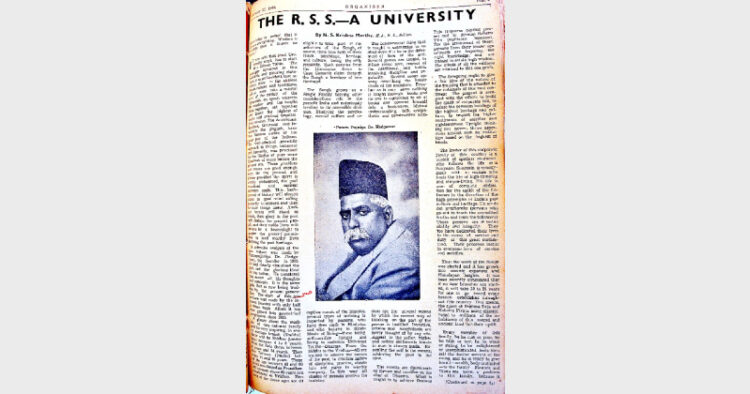Vol. 1, No. 30. Delhi: Thursday, Paush Shukla 11, 2004, January 22, 1948, Four Annas
“Knowledge is proud that it knows everything. Wisdom is humble that it knows no more.”
It was said that ideal University work has to start at a Dinner Table. The principle involved in this palatable and pleasing statement is so self-evident that an Indian, alive to the ancient Hindu culture and traditions, will at once take a mental view of the period of the Upanisads, an epoch wherein the teacher and the taught lived together, sat together and learnt the highest of truths and attained uparalleled wisdom. The Americans, Russians, Germans and inevitably the English, have now become aware of the great past of the Indians. The well-admired scientific approach to things, temporal and heavenly, was practiced by the Hindus of yore some thousands of years before the present era. This background of history will always stand in good relief aiding posterity to unlearn and then to learn things anew.
A scientific analysis of the past history was made by Parampujaniya Dr. Hedgewarji, the founder in 1925. He had clearly visualized the path and the glorious ideal for the nation. He translated into action all his thoughts and concepts. It is the same path that is now being trodden by the present generation. The start of this new culture was made by the revered founder with only half a dozen boys. Albeit, it has now grown into geometrical progression, since 1925.
A glance about the working of this national family will be very inspiring. In every average branch (Shakha) there will be Shishus (tender boys between 4 to 8 years). Next the Bals (boys between 8 years and 14 years). Then the Tarunas (youths) between 14 to 40 years. Those of the age between 40 and 60 years are classed as Prowdhas. All persons above 60 years are considered as Vridhas. Persons of all ages are eligible to take part in the activities of the Sangh, of course, their firm faith in their Hindu parentage, heritage and culture, being the only requisite. Such persons from the Himalayas down to Cape Comorin claim through the Sangh a bondage of brotherhood.
The Sangh grows as a Single Family barring other considerations rife in the present India and notoriously tending to its ostensible division. Studying the psychology, mental caliber and receptive moods of the inmates, several types of training is imparted by persons, who have firm faith in Hindutva and who believe in Hindu ideals of living – these being self-sacrifice (tyaga) and living to maintain Universal Truths-Dharma.
The fundamental thing that is taught is submission to an ideal even if it be to the detriment of love of the self. Several games are taught, to infuse social love, respect of the neighbor, and habits involving discipline and regularity. Several songs are sung describing the heroic deeds of the ancestors. Peculiar as it may seem nothing it taught through books and no one is compelled to sit at books and convert himself into a bookworm. Mutual understanding, talk, sympathetic and constructive criticisms are the several means by which the correct way of thinking on the part of the person is instilled. Invective, rebuke and haughtiness are never thought of by any one. Appeal to the softer, higher and nobler sentiments innate in man is always made. Ennobling the self is the means; achieving the good is the ideal.
The results are disinterested service and sacrifice at the altar of Dharma. What is taught is to achieve Brahma Teja (supreme psychic power) and to develop Kshatra Vira (righteous heroism). For the attainment of these, persons from their tender age onwards are imparted the right knowledge and are trained to attain high wisdom. The minds of all the millions are attained to this one pitch.
The leader of this corporate family of this country is a person of spotless character who follows the life of a Sanyasin. Sanyasin is synonymous with a recluse who leads the life of high-thinking and simple-living. His life is one of complete dedication for the uplift of the followers in the direction of the high principles of India’s past culture and heritage.
Thus the work of the Sangh was started and it has grown into oceanic expanses and Himalayan heights. Every member of this family, be he rich or poor, be he high or low, be he weak or strong, be he enlightened or unsophisticated, feels himself the dutiful servant of the cause, and he is ready to give his all—wealth, body and mind —to the family. Finance and funds are never a problem to this family, because it lives and grows on the willing sacrifices made by its members.
No speech, no writing, no lecture and no propaganda and no laudation can fully describe the work of this family. The best way to know about this family is to join it and live the life as a member of it.
-By N.S. Krishna Murthy, M.A., B.L., Nellore














Comments